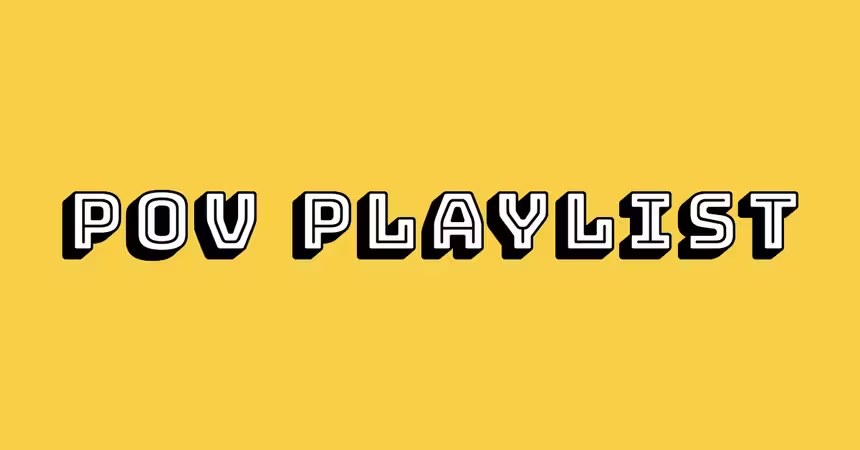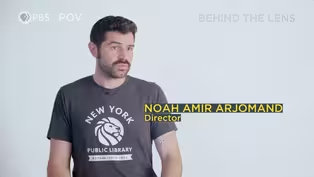
Anatomy of a Scene: Eat Your Catfish
Clip: Season 36 Episode 3605 | 3m 44sVideo has Closed Captions
Anatomy of a Scene from Eat Your Catfish with Noah Amir Arjomand.
Anatomy of a Scene from Eat Your Catfish with Noah Amir Arjomand.
Problems playing video? | Closed Captioning Feedback
Problems playing video? | Closed Captioning Feedback
Major funding for POV is provided by PBS, The John D. and Catherine T. MacArthur Foundation, the Wyncote Foundation, Reva & David Logan Foundation, the Open Society Foundations and the...

Anatomy of a Scene: Eat Your Catfish
Clip: Season 36 Episode 3605 | 3m 44sVideo has Closed Captions
Anatomy of a Scene from Eat Your Catfish with Noah Amir Arjomand.
Problems playing video? | Closed Captioning Feedback
How to Watch POV
POV is available to stream on pbs.org and the free PBS App, available on iPhone, Apple TV, Android TV, Android smartphones, Amazon Fire TV, Amazon Fire Tablet, Roku, Samsung Smart TV, and Vizio.

POV Playlist
Every two weeks, we curate a selection of POV docs, old and new, around a central theme. Stream while you can — until the next Playlist!Providing Support for PBS.org
Learn Moreabout PBS online sponsorship“ My name is Kathryn.
And five years ago I was diagnosed with ALS.
Telling my kids my diagnosis was the hardest part.
Just thinking of leaving them filled me with grief.
” My name's Noah Amir Arjomand.
I'm one of the directors of Eat Your Catfish .
Eat Your Catfish is the story of my mom, Kathryn's last few years of life with ALS.
It shows her relationship with family and professional caretakers and also her reflections on the meaning of life, on her relationship with my father, her husband Saeed, with me, and her feelings about my sister Minou's upcoming wedding.
In this scene, we see kind of a conflict between my mother, Kathryn, and me.
She's upset because her Eyegaze computer isn't working properly.
She has a backup, which is this kind of alphabet board, which is very helpful, but not very intuitive to use.
And so she's with a nurse who doesn't know how to really use that yet.
“Did you do the alphabet board with her?
No.
She wants the alphabet board.
Always ask her if she wants to do the alphabet board.
No.
Why me?
Other people have to learn how to use the alphabet board."
-[Noah] The background to this is that I'm about to... leave, I'm about to go to Turkey to do research for several months.
I'm feeling extremely guilty about this.
As we're arguing and as she reaches the point of saying, I want to die, really, what's behind it is we're both almost kind of transmuting into this object of the alphabet board or into the specific problem she's having that night.
Our... emotions about this kind of pain of leaving or being left.
“D I E You want to die?
Well.
This is stupid.
Frankly, it's ******* selfish to do this before I leave.
You know I already feel guilty about leaving.
You're definitely intending to make me feel guiltier when you say that.
When you say, 'I want to die.'
And you keep saying this right before I go.
You keep telling me, Oh, it's fine.
Go to Turkey.
That's great.
Do your thing.
And then you do this."
-[Noah] When my mother first got diagnosed with ALS, I had gone and watched a lot of other documentaries about disability generally, about ALS.
And very often there kind of is focus on inspiration, on showing heroism and so on, that I thought that making a film that shows a fairly dysfunctional family struggling with one of these issues would be some way to at least show people who are in similar situations that they're kind of... not alone or uniquely bad at handling such challenges.
“ You might be asking, how could she want to be alive with an illness such as this?
How can she enjoy this great spectacle of life without going nuts because she cannot participate?
Love makes life totally compelling.
How grateful I am for every moment with you.
”
Behind the Lens: Eat Your Catfish
Video has Closed Captions
Clip: S36 Ep3605 | 1m 47s | A message from the filmmaker. (1m 47s)
Providing Support for PBS.org
Learn Moreabout PBS online sponsorshipSupport for PBS provided by:
Major funding for POV is provided by PBS, The John D. and Catherine T. MacArthur Foundation, the Wyncote Foundation, Reva & David Logan Foundation, the Open Society Foundations and the...












